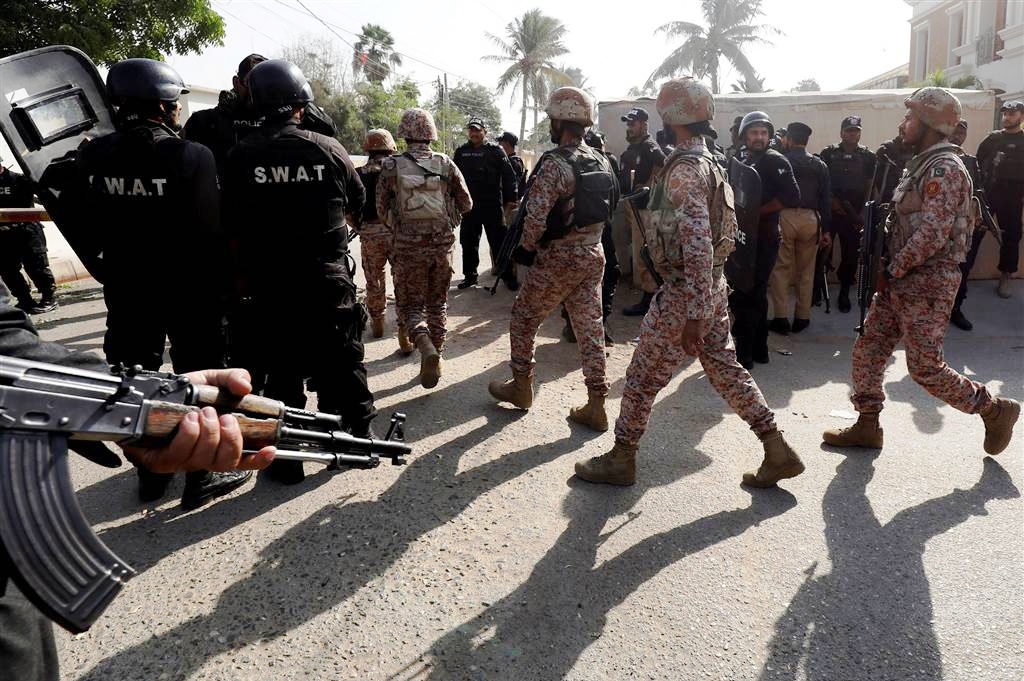By Khalid Hussain
Forces successfully protected the Consulate of Peoples Republic of China when four gunmen tried to enter the consulate but were intercepted at a checkpoint today at 9:30 am in Karachi. Two policemen lost their lives and a security guard was injured stopping a group of gunmen the as they stormed the Chinese consulate Karachi.
- Security forces killed all three attackers and secured the building, Pakistan’s military said in a statement adding, “No Chinese citizens or Pakistani civilians were killed.”
China condemned the attack and urged its ally to ensure the security of its citizens. Prime Minister Imran Khan has made obvious the “One Belt One Road” connection when he identified China being the target of this terror attack. He denounced it as a “conspiracy…against China-Pakistan strategic cooperation”.
“China strongly condemns any violent attacks against diplomatic agencies and requests that Pakistan takes practical measures to ensure the safety of Chinese citizens and institutions in the country,” foreign ministry spokesman Geng Shuang said at a regular press briefing. “All of our Chinese friends and officials who work at the consulate, 21 in total, all of them are safe and they have been shifted to a secure location,” said Pakistani Foreign Minister Shah Mehmood Qureshi at a press conference. “The area is now clear.” The Prime Minister has also ordered an inquiry.
Global and local media reported a known terrorist group has claimed responsibility. The four men who attacked the consulate were heavily armed with automatic weapons and hand grenade bombs. The security at the Chinese Consulate must be commended for showing Pakistan can counter terrorism.
Security is the highest priority for the Belt and Road Initiative (BRI)—also known as the One Belt One Road (OBOR)—called the China-Pakistan Economic Corridor (CPEC)s at high priority. Beginning in April 2015, the CPEC is a political gamble being part development scheme and part strategic planning. Beijing and Islamabad have always been close allies. CPEC projects promote connectivity across Pakistan with a network of highways, railways, and pipelines accompanied by energy, industrial, and other infrastructure development projects.
Many of these projects also address power generation to boost Pakistan’s economic growth. The CPEC also establishes a trade route overland that connects China to the Indian Ocean from the city of Kashgar to the port of Gwadar with a total cost overlay of US dollars 62 billion over the next fifteen years. This highly ambitious plan calls for new sovereign investments in roads, railways, pipelines, ports, and information networks to deepen economic integration and connectivity across Asia and into Africa and Europe.
Pakistan and China work closely in monitoring known sources of terrorist threats from the former tribal areas called FATA. Many Jihadi groups operating in the border areas of Afghanistan with Pakistan and China. CPEC is the new engine of the economy in Pakistan and growth has a high political value for stability.
Pakistan has since 2016 a dedicated security force to keep all CPEC projects and personnel safe. In the Khyber Pakhtunkhwa province, many CPEC road networks are planned to run near or through territories with known Taliban and other Jihadi terrorist activity. A large force works to safeguard against terrorist groups attacking construction crews and/or disrupting the flow of goods.
Jihad in Afghanistan has given security a complex twist in Pakistan. There is a history of regional countries blaming each other for acts of terror by Jihadi and other terrorist groups. It is simple out-sourced gorilla warfare that goes under the wider rubric of Jihad in Afghanistan.
The BRI in Pakistan has also raised many concerns in India. The United States of America is also fiercely opposed these developments. Gwadar Port is a case in point where BRI detractors fear China might establish a naval base in the Indian Ocean. Indian Prime Minister Narendra Modi has moved formal challenges to the BRI in Pakistan with Beijing claiming some current and proposed projects run through territory with India. Pakistan, of course, refutes these claims.
The CPEC is designed to transform Pakistan’s economic outlook. Once the basic infrastructure gets in place, it will spark a wave of foreign investment. The United States and China have their own long-term issues and engagements with each other that bear upon CPEC security concerns.
The CPEC represents the leading edge of China’s expanding access and influence across the emerging region of Eurasia. Beijing and Washington already appear to start competing for influence in Islamabad. Hence CPEC impacts many other U.S. goals in Pakistan and in the region. Pakistan has been trying to best pursue balanced relations with Beijing and Washington. The security challenges are complex but Pakistan appears to be pursuing well distinct ties with both sides.
For Pakistan, the future is an opportunity that needs to be secured. May be the Chinese and Pakistani officials are able to rope in the US as well to make the CPEC an opportunity for trilateral or multilateral cooperation.
__________________________________________________________________________________________________________________
Khalid Hussain is Resident Editor of TLTP – You may contact Khalid Hussain at Resident.Editor@lawtoday.com.pk.pk




